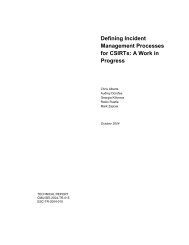The Global Innovation Index 2012
The Global Innovation Index 2012
The Global Innovation Index 2012
Create successful ePaper yourself
Turn your PDF publications into a flip-book with our unique Google optimized e-Paper software.
cHApTEr 1<br />
<strong>The</strong> <strong>Global</strong> <strong>Innovation</strong> <strong>Index</strong> <strong>2012</strong>: Stronger <strong>Innovation</strong> Linkages for <strong>Global</strong><br />
Growth<br />
Daniela BenaVente and Soumitra Dutta, INSEAD eLab<br />
Sacha wunSch-Vincent, WIpO<br />
<strong>The</strong> global economic recovery is<br />
fragile and uneven across different<br />
regions.<br />
Most current economic forecasts<br />
by leading international economic<br />
institutions predict a slowdown<br />
of gross domestic product (GDP)<br />
growth throughout <strong>2012</strong> and an<br />
uncertain recovery in 2013.1 Despite<br />
some setbacks, growth remains relatively<br />
strong in most emergingmarket<br />
economies. <strong>The</strong> situation in<br />
high-income economies, however,<br />
is more precarious. Unemployment<br />
is high and growing in many of these<br />
countries. Full crisis recovery will<br />
take its time, and there are risks of<br />
a renewed degradation of the economic<br />
climate resulting in a prolonged<br />
state of uncertainty.<br />
In this context, the economic<br />
policy debate is placing renewed<br />
emphasis on achieving an appropriate<br />
policy framework that fosters<br />
growth and employment while promoting<br />
sustainable public finances.<br />
As outlined in the Preface to this<br />
report, policies that promote innovation<br />
and structural policies fostering<br />
long-term output growth should<br />
feature prominently in these discussions.<br />
Although innovation cannot<br />
cure the most immediate financial<br />
difficulties, it is a crucial element<br />
of sustainable growth. Forwardlooking<br />
measures are needed to lay<br />
the foundations for future prosperity.<br />
<strong>The</strong> economic crisis is affecting<br />
not only investments but also the climate<br />
for innovation.2 <strong>The</strong> effect of<br />
this downturn on innovation is complex<br />
and ambiguous, with large variations<br />
across firms, sectors, countries,<br />
and regions. On the one hand,<br />
crisis might stimulate new entrepreneurial<br />
ventures and growth areas.<br />
Past crises in the 1990s are said to<br />
have generated new strings of innovative<br />
companies and may have put<br />
entire nations—such as Finland and<br />
the Republic of Korea—on a new<br />
growth path.3 Countries that continue<br />
to invest in innovation despite<br />
economically worsening conditions<br />
are reaping the benefits of their<br />
efforts at some point.<br />
On the other hand, true risks<br />
exist in terms of a negative effect on<br />
innovation expenditures and outputs.<br />
Total and/or business R&D<br />
investments have declined as of 2008<br />
or 2009 in a significant number of<br />
countries for which data are available<br />
(for example, in Canada, Israel,<br />
Lithuania, Netherlands, Spain,<br />
Sweden, and the United Kingdom,<br />
or UK).4 Moreover, the world’s<br />
top R&D investors decreased their<br />
R&D spending by 1.9% in 2009.5<br />
<strong>The</strong> crisis is expected to have slowed<br />
the introduction of new products<br />
or processes, primarily because of<br />
decreased demand and increased<br />
business uncertainty, including<br />
uncertainty about the size of the<br />
future market. Large multinational<br />
firms responsible for a large share of<br />
business R&D have recently accumulated<br />
large cash stocks that are not<br />
being reinvested.<br />
Unmistakably, reductions or a<br />
streamlining of R&D expenditures<br />
in times of crisis does not have to<br />
affect research output or innovations<br />
if efficiency is improved and less<br />
promising projects are discontinued.<br />
Still, firms—in particular small and<br />
medium-sized enterprises (SMEs)—<br />
face greater difficulties in tapping<br />
external sources of funding to support<br />
their innovation investments<br />
and to finance new business ventures.<br />
<strong>The</strong> access to venture capital is<br />
still severely depressed. <strong>The</strong> number<br />
of firm creations is down in countries<br />
for which data are available.<br />
Importantly, research and<br />
development (R&D) and innovation<br />
expenditures cannot often be<br />
stopped and subsequently picked<br />
up again simply when the economy<br />
recovers. Initial investments are<br />
sunk. Researchers deskill and PhD<br />
students without funding go into<br />
other fields. <strong>Innovation</strong> that is postponed<br />
now will also not take place<br />
later; there are hysteresis effects in<br />
innovation.<br />
Knowing the exact effects of the<br />
economic crisis on business innovation<br />
will take time. <strong>The</strong> questions<br />
involved are too complex to be<br />
reduced to a blanket assessment of<br />
the effect of the economic slowdown<br />
on the level and geography of innovation.<br />
Moreover, such an assessment<br />
is premature and data to fully<br />
assess the impacts are only emerging.<br />
Also, as part of their stimulus<br />
packages, in 2009 and onwards most<br />
3<br />
THE GLOBAL INNOVATION INDEX <strong>2012</strong> 1: <strong>The</strong> <strong>Global</strong> <strong>Innovation</strong> <strong>Index</strong> <strong>2012</strong>






